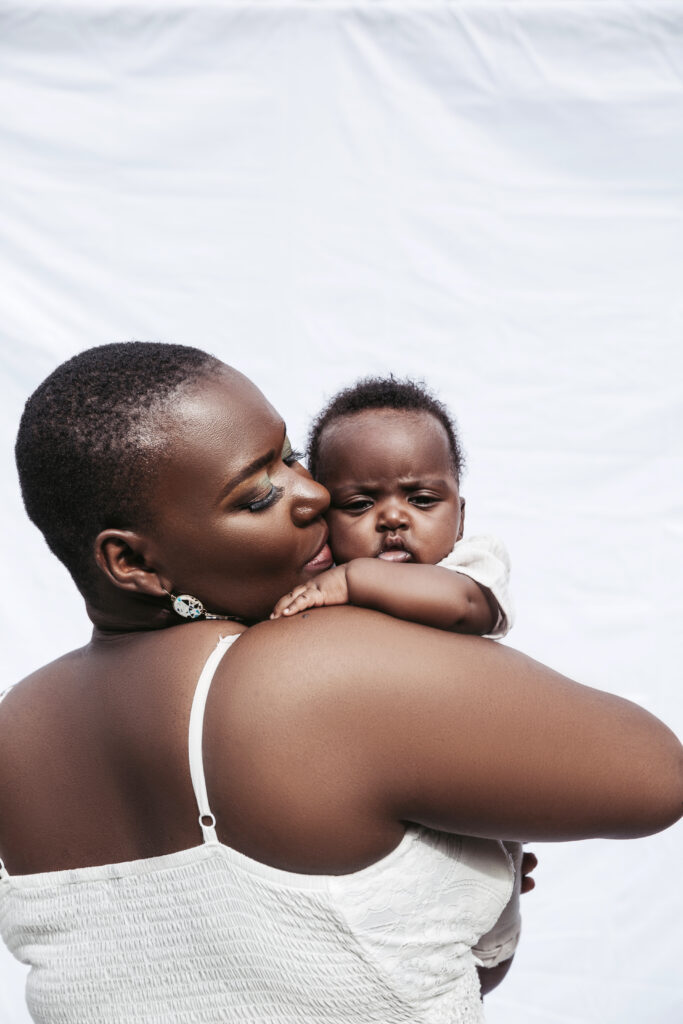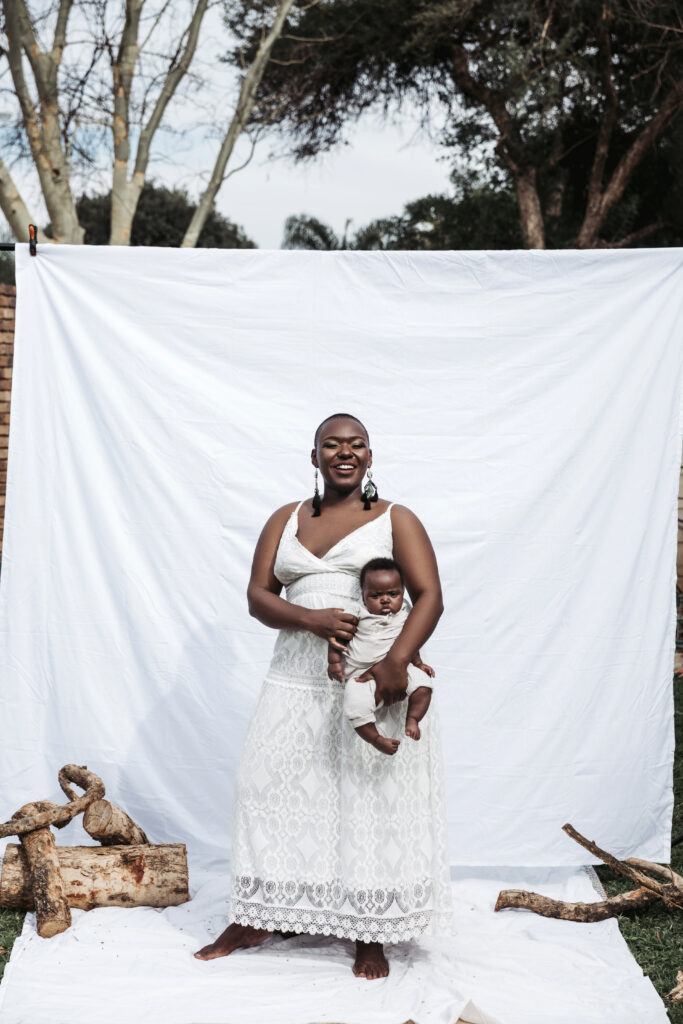Nhlanhla Mthembu Does Motherhood on Her Own Terms: Being Pregnant And Unmarried Wasn’t the Plan, But So What?
Share

In our latest cover image, Nhlanhla Mthembu is posing regally against a stark white bed sheet that’s gently billowing in her backyard. For as long as humans have ascribed meaning to colours, white has often represented purity and innocence. However, Nhlanhla’s presence in this image coats the colour with added meaning. Her dignified posture, gently elevated chin and concentrated gaze into the distance augments the white theme of the photo into a symbol of a clean slate, a fresh start, progress and transformation.

Nowadays, millennials are reimagining societal standards that portray the ideal life as going to school, landing your dream job, meeting the love of your life, getting married, buying a house and having children in consecutive order. Teens entering into adulthood have often expected their lives to follow that exact order, only to be disappointed when it doesn’t happen that way. The truth is achieving some of these goals may be harder due to economic reasons like high unemployment rates in our country, or gender relation tensions like GBV. Alternatively, it could be that some of these ‘rites of passage’ may not appeal to certain people for personal reasons or that life merely takes its own course.
For Nhlanhla, an avid woman of faith who grew up with strong Christian values, the principle that babies follow after love and marriage was a strong one. When she got pregnant out of wedlock, she felt that she might have robbed herself and her unborn child of that ideal family home that’s so often treasured in the church and within society in general.

“I was not at all happy when I found out I was pregnant because it was not how I planned it,” says Nhlanhla. “Growing up Christian, I had hoped to get married and then have a baby. When it happened I was mostly disappointed with myself and wondered if I should have been more patient. I wanted the ideal, as most people do, which is having a mom and dad at home who are married. And it was sad because I was questioning myself and thinking maybe my baby may not get to have that. I was grieving a lot.”
The grief that Nhlanhla felt is reasonable. Throughout history, society has shunned and stigmatized individuals involved in pregnancy out of wedlock. Mothers are often shamed by their communities or have sometimes been pressured to marry the partner despite their incompatibility. Equally, children born from this situation have also been deemed as illegitimate, a term which is used less these days to its ability to fuel further discrimination, slander and marginalisation of the family involved. Generally speaking, society has progressed from this way of thinking and single motherhood is by and large more accepted. However, women may suffer from an inner-conflict in these instances.
For instance, Nhlanhla did not have to experience shaming from her family or community. Her mother played a pivotal role in tending to her cravings and needs while she was pregnant during 2020’s early lockdown restrictions. Despite the support from her mother as well as the father and other relatives and friends, Nhlanhla battled her desire for the ideal internally.

“From a young age, I knew that you had to get married. You grow up with that mentality that you have to do certain things like going to church, listening to parents, staying away from boys and that If you don’t do the things you’re not supposed to do, God will give you the things that you want in the end. But, you know, in between all of that (and the church doesn’t teach this) life is going to happen and things may not always work out the way you anticipate.”
With the desire to heal, Nhlanhla took the flower by the thorns and sought help by attending therapy, reading about other women who were in similar situations and having conversations with her creator.
“I went to therapy. When I found out I immediately booked a session with my therapist. I cried and I told her “I don’t know if I’m ready for this.” Therapy helped me throughout the process as well as conversations with my creator and reading stories about other people and how they had dealt with something like this. It was important for me to learn that you can’t have control over everything and when it comes to creating a life, we don’t always have control over that. There’s nothing wrong with planning, but it’s also important to leave room for life, and for God or nature to take its course which is something I think I failed to do. Eventually though, I trusted the fact that the God that I served loved me the same.”
She subsequently quotes a well-liked Bible verse among Christians: Jeremiah 29:11-13, which starts with the verse “For I know the plans I have for you,” declares the Lord, “plans to prosper you and not to harm you, plans to give you hope and a future.” They were written by Jeremiah to the Hebrews who were in the midst of suffering under the rule of Egyptian and Babylonian Empires. The message that most Christians take away from this is an encouragement to embrace the situations one finds themself in, let go and trust the promise of a bright future.

Acceptance is often deemed an integral part of most healing processes and as Nhlanhla looks ahead into the distance of her yard, she embodies a serene look of certainty, trust and faith in the future that is laid out for her with baby Maru.
As she offers up a story of how she came to name her baby, the luminous white background of our cover photo gains extra meaning. Before finding out she was pregnant, Nhlanhla was cloud gazing on a trip to Durban with her sister. On the way there, she spotted a cloud in the shape of a mother holding her baby and continued to admire the accuracy of the shape. “I was in awe of them and was just like “Oh my God look at the clouds, look at how pretty they are, the mom and her child,”” she recalls. Well into her pregnancy, she had gone through a series of names and had struggled to find one that fit.

“I asked myself about how God communicates to me and what makes me feel good when I’m depressed, what makes me happy. And honestly, looking at the sky is one of those things,” she says, tearing up. “I prayed about it and I eventually got to Maru.”
“At the end of the day, naming him Maru was important because it was a reminder that God communicates with me and God did communicate with me through those clouds shaped into mother and child. That was just a few days before I found out I was pregnant. In the past as well, I’ve always been fascinated with clouds and have known that God is watching over me and that God is with me.”
The cover photo is not just a maternity shoot, but a symbol of Nhlanhla’s transformation. It’s a shedding of old ideals to make room for new life and everything unexpected. With the significance of clouds in her life, the white is also a recognition of the heavens, God and their connection through Maru. But what’s most striking, outside of Nhlanhla’s beauty, is how organic the image is. The logs lying around and the pegs holding up the sheet convey ease and an acceptance of life no matter which way it chooses to show up.

“Maru is constantly changing. He’s not who he was when he was a month old. I look at him sometimes and I wonder why he chose me to be his mother. What is it about me that made him think I would be fit enough to be his mother? I’ll probably never find the direct answer to that, but it is something that we’ll both find out as we grow and challenge each other and as I learn about myself as well. There isn’t anything that happens to us that isn’t for us.”





𝑰 𝒍𝒐𝒗𝒆 𝒊𝒕 𝒂𝒍𝒐𝒕, 𝒕𝒉𝒊𝒔 𝒆𝒏𝒄𝒐𝒖𝒓𝒂𝒈𝒆𝒔 𝒎𝒆 , 𝒊 𝒂𝒍𝒔𝒐 𝒉𝒂𝒗𝒆 𝒂 𝒔𝒓𝒐𝒓𝒚 𝒕𝒐 𝒕𝒆𝒍𝒍.
We’re so happy you enjoyed Nhlanhla’s story. Please email hello@batswadi.co.za for any inquiries.